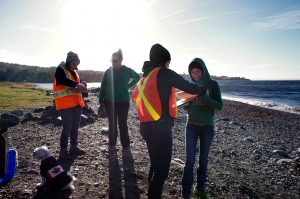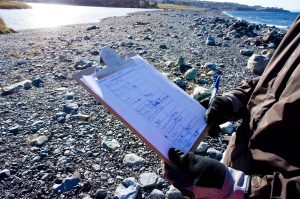The oceans are in peril. Acidification threatens planktons’ ability to produce shells vital to their survival, corals are dying from excess acidity, and rising sea levels threaten coastal communities (Hoegh-Guldberg, Mumby, Hooten, Steneck, Greenfield, Gomez, & Knowlton, 2007). Despite the arm waving of the climate change deniers, these threats are anthropogenic in origin (Hoegh-Guldberg et al., 2007). I find it ironic that the species creating these problems is intelligent. Why are humans not making progress towards solving the ocean’s problems?
I propose the seas’ problems may be too technical for the general public to comprehend. Others suggest the manner in which scientists report these problems may create a gap between the public and science community (Peters, 2013) or that scientists fail to create public understanding (Bauer and Jensen, 2013, p. 3). Perhaps when individuals face complex problems alone they feel insignificant and powerless to affect change. I suggest Community-Based Participatory Action Research (CBPAR) could help remove of the outlined barriers to solving the oceans’ problems.
Community-Based Participatory Action Research is problem-driven and has a responsive design that is engaging to participants because they become involved stakeholders (Leavy, 2017, p. 237). Moreover, the degree of involvement can vary but may reach the level of full collaboration where participants and the principal researcher have a “full research partnership” (p. 238). This partnership is significant as people treated as equals by researchers are sincerely asked to contribute information, and even assume leadership positions within the research. This agency makes them feel valued – because they are valued.
I have witnessed this during citizen-science research on ocean plastics with the Civic Laboratory for Environmental Action Research or CLEAR. Elbow to elbow scientists and “lay people” gathered plastic garbage from a beach then counted and measured collaboratively to determine the beach’s pollution status. I was a witness to direct and engaged communication between all collaborators and the acceptance of participants of all ages (teens up to senior citizens). The university researcher, Dr. Max Liberon, asked the participants, “Where are the best places to find that sample?” or “Why do you think that showed up there?” When a scientist asks you questions, authentic research questions, it eliminates the “gap” between the public and the scientific community (Peters, 2013). Also, the closeness of the collaborators allows for mutually beneficial learning (Leavy, 2017, p. 238) and creates public understanding (Bauer and Jensen, 2013). Both of these communication solutions help people to feel valued and confer a sense of agency to stakeholders.

Researchers from the CLEAR (in orange vests) recording ocean plastics data collected by community research participants (photo – courtesy of CLEAR).
How does this affect the belief that a single person has the power to effect change? E.O. Wilson is a famous biologist who studies social insects. One of my favorite quotes from Dr. Wilson is, “One ant is no ant. Two ants and you’ve got something.” This statement parallels our species; when humans form a group to attain a goal, social factors increased the chance of success. A fundamental phenomenon of social psychology that may explain this is social facilitation. Social facilitation is improved performance of learned tasks in the presence of others (Myers & DeWall, 2015, p. 532). However, I believe a better explanation may be that group members of different backgrounds can function together as a collective to achieve “superordinate goals” (p. 564). A superordinate goal is one that can only be achieved through cooperation because barriers between strangers are eliminated (p. 564). Once group members have a shared identity and they cooperate, they share power, making the group power greater than the sum of the parts. Group cooperation eliminates an individual’s feeling of weakness and promotes agency within individuals.
I believe Community-Based Participatory Action Research is a useful form of social research for addressing ocean problems and promoting planetary change through the realization of superordinate goals, communication, and transforms an individual’s feeling of agency. From my perspective, CBPAR is an egalitarian form of social research that breaks down human-created barriers, such as communication issues, to foster the collective power of humanity. With more CBPAR projects related to the seas, I think humans could collectively make progress towards identifying ocean problems and develop the human wave of transformation, needed to protect this precious resource.
Post Script – This writing is helping me contemplate with my position as a researcher. There will be times when I need to be an authority (such as professional development). However, I also need to learn about peoples’ thoughts, feelings, and attitudes towards the topics of my research. This will require me to be available, equal, and unguarded in conversation. This can be a bit scary. As a teacher I have always been honest with students – never trying to deceive them. It allows you to engage in conversations about learning problems; conversations you may never have if you appear unavailable and aloof. These thoughts are a work in progress.
Next blog – Writing chapters! Cheers, Pat

